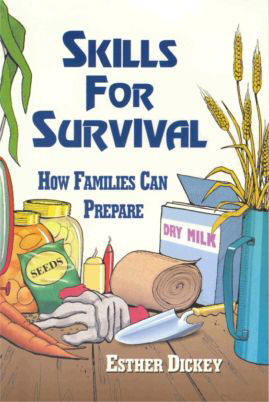Home - Latest News
Bayside Prophecies
Directives from Heaven
Miracles & Cures
Veronica Lueken
Miraculous Photos
|
Skills for Survival - How Families Can Prepare Most of the last two generations in this country have never known "want." We cannot prepare for it until we are convinced of the need for and benefits to us personally. Through careful preparation we can free ourselves from concern over the impact of world situations or personal problems such as economic collapse, drought, famine, energy crisis, illness, reduced standard of living, unemployment, war, death, or natural disasters. Yes, for possible emergencies we need food storage, but in order to survive, to cope with the future and not be depressed, we must prepare ourselves and our minds to change our lifestyle. These training techniques have come forth at a time when the world needs them most, and are being taught across the nation to businesses, colleges, industries, athletic teams, and in prisons. We can live comfortably and safely if modern conveniences become unavailable by: getting water from other sources; wearing darker clothes that are easier to keep clean; walking many places instead of driving, raising a little meatórabbits, chickens, a goat or calf; planting food crops, harvesting them, and preserving the surplus; and gathering greens from the fields and ditch banks in the spring. With the possibility of widespread disaster growing more real each year, it is becoming increasingly obvious that we must truly be a prepared people. We need to help each other learn what we need to do to prepare. This work explains how to do these things and more, so we will be ready when the time comes. While this book covers emergencies, gardening, and foods, it is by no means intended to be an exhaustive study in these areasómerely an effort to "whet the appetite" of the reader and stimulate the desire to "be prepared." Highly recommended, itís a classic in the field of disaster preparedness and survival! Paperback 6"x9" 220 pages |
|
|
Home - Latest News | Order Form | Bayside Prophecies | Directives from Heaven | Miracles & Cures | Veronica Lueken | Miraculous Photos |
The electronic form of this document
is copyrighted.
Quotations are permissible as long as this web site is acknowledged
through hyperlink to:
http://www.tldm.org
Copyright © These Last Days Ministries, Inc. 1996 - 2004 All
rights reserved.
P.O. Box
40 616-698-6448
Lowell, MI 49331-0040
Revised:
June 20, 2014
